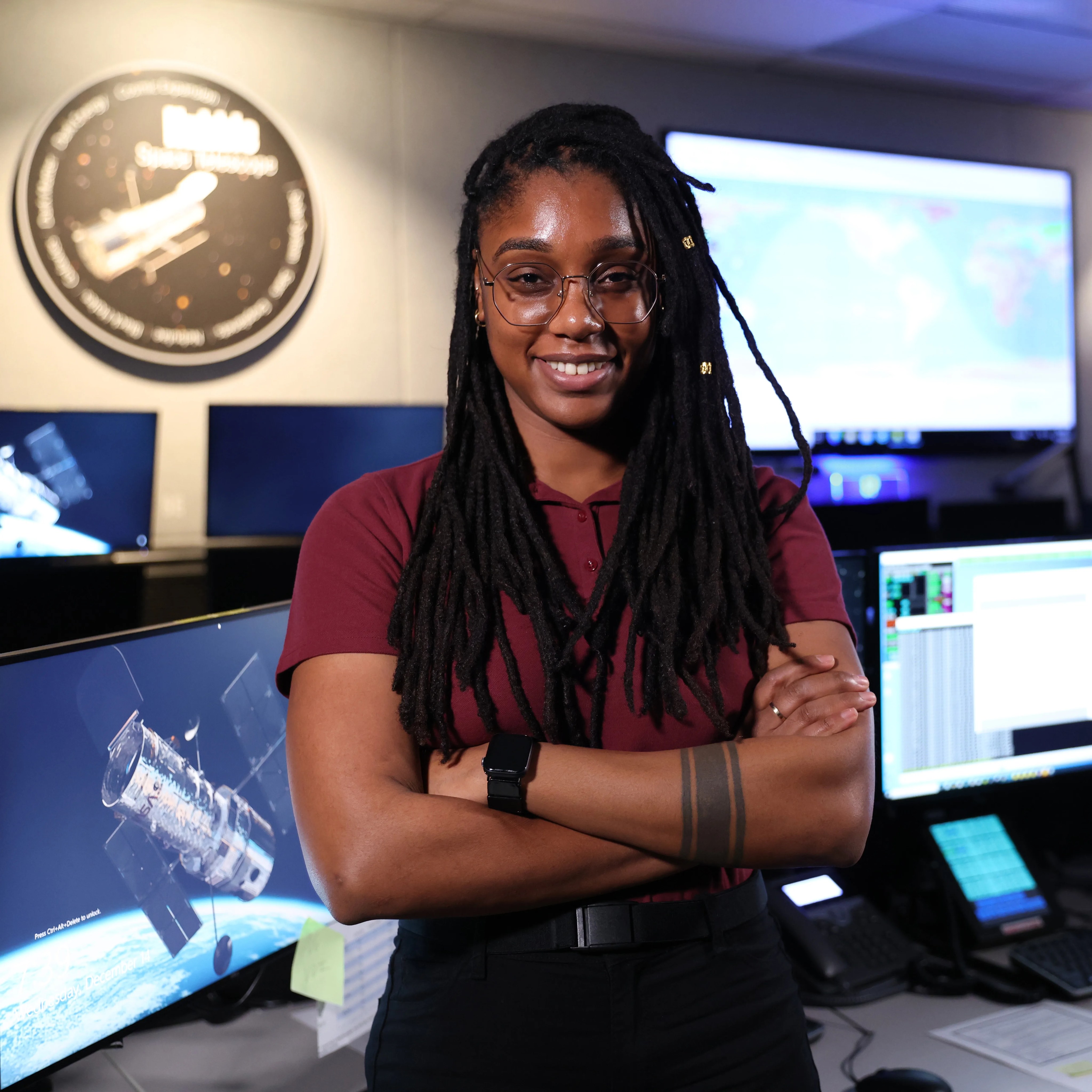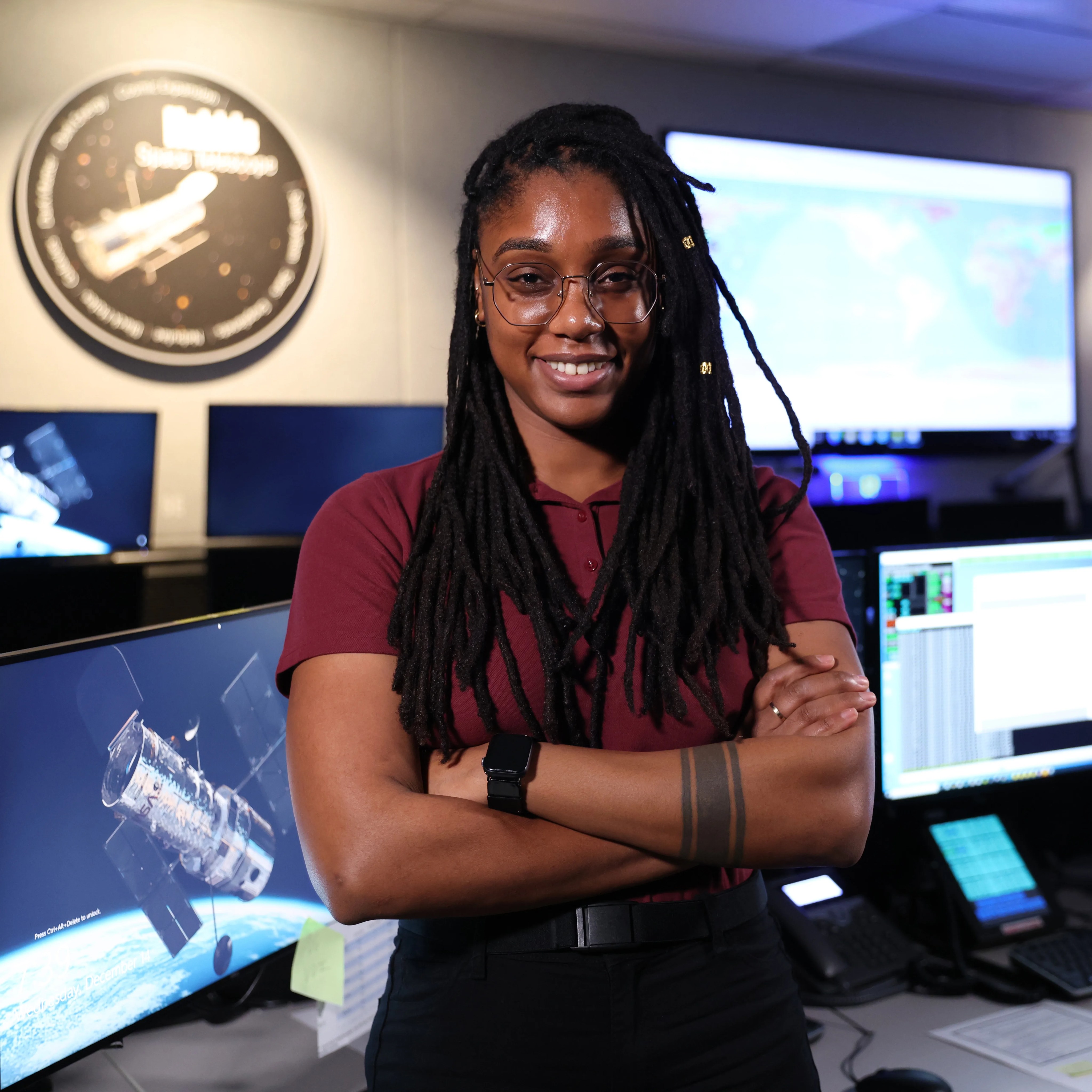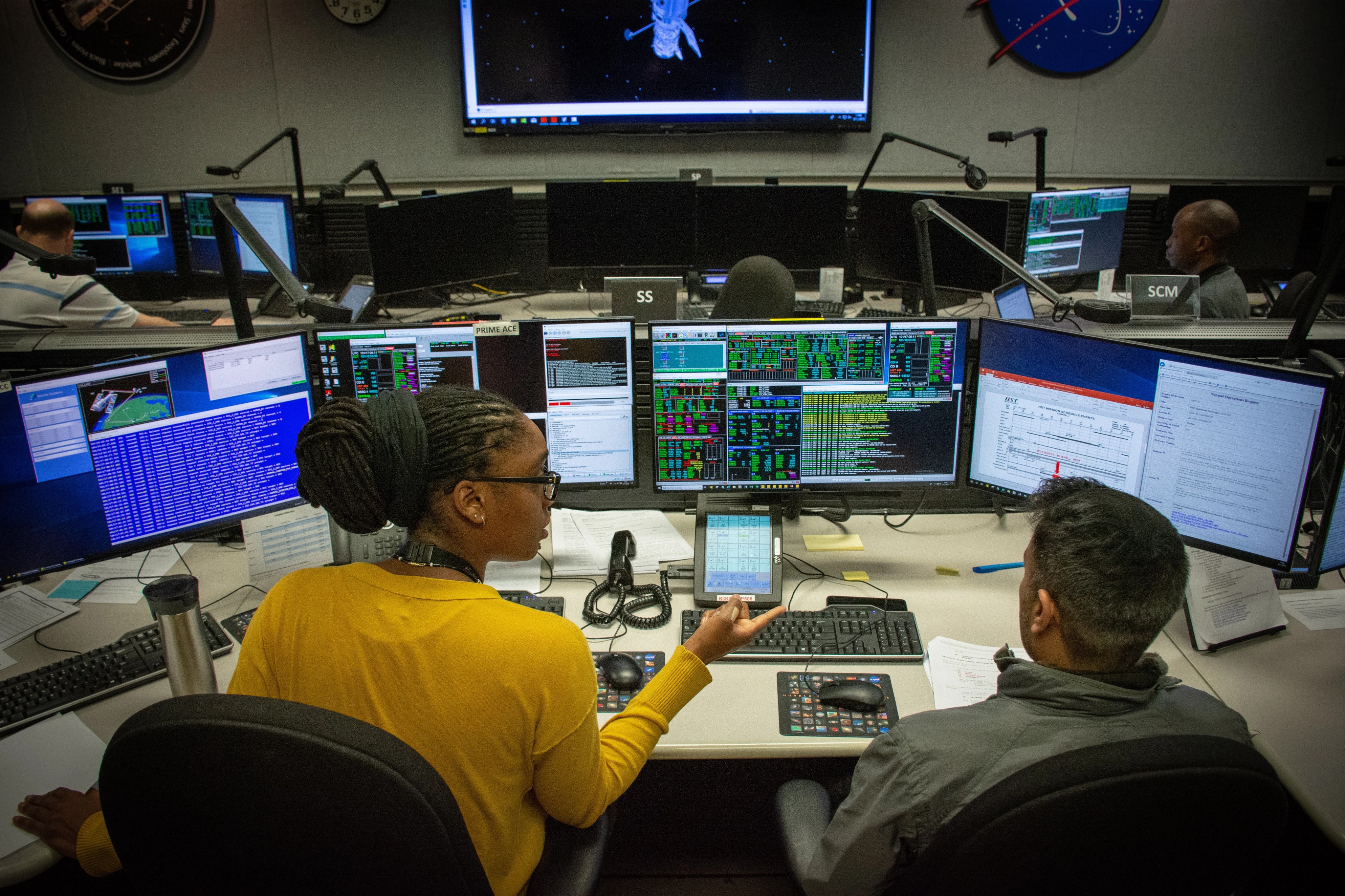
Phathom Donald
Mission Engineer
Phathom Donald has always been in awe of the stars. In her childhood, her father took her and her brothers to the Griffith Observatory in Los Angeles, where her fascination only grew. “I loved going to those shows in the planetarium, just feeling engrossed in what they were teaching, feeling filled with so much wonder,” she said.
One day, Phathom’s parents found her in her room playing with a mini amusement park she had built out of K’NEX kits, and suggested she become an engineer. Her father, a retired power electrician, was especially encouraging of Phathom’s pursuits. She enrolled at Howard University to get her bachelor’s in electrical engineering, but despite her rigorous course load, she could never quite escape the pull of the stars. “There was one year in college where I looked out of my window and I saw the Orion constellation. It had been a while since I looked up at the sky, and I just broke down. It was so beautiful and wondrous.”
Phathom had long ruled out a career in space. “It just seemed like a fantasy to not even strive for,” she said. She planned to use her electrical engineering degree to work for a utility company. But in her senior year of college, her design professor invited the project manager for the NASA Transiting Exoplanet Survey Satellite (TESS) mission to speak to Phathom’s class. He spoke about the field of systems engineering and its importance to the TESS mission, which searches for exoplanets by measuring dips in the brightness of stars, indicating that a planet has passed in front. Within five minutes of his presentation, Phathom had chosen a new direction.
“I was on the verge of tears,” she recalled. “It just hit me like a ton of bricks. I can’t really explain the feeling, but this presentation reminded me of what I truly love and what I’m really passionate about. More importantly, it made me feel like a career at NASA was attainable.”
Phathom worried she was too late to change her course of study. She thought that she would have to become an aerospace engineer to work at NASA, and her graduation date was nearly upon her. Feeling lost, she emailed the project manager who had spoken to her class and asked for advice, assuming little chance of a response. He emailed back the next day.
“He just laid it all out,” Phathom said. The project manager told her which companies to apply for, which schools to consider for a master’s program, and what books to read. He told her that not everyone at NASA is an aerospace engineer, and that NASA needs electrical engineers to keep missions running. “I saved that email,” she said, “And I took his advice.”
I’m proud of myself for putting myself out there.

Phathom Donald
Mission Engineer
Upon graduating from Howard in 2014, Phathom got a job at Lockheed Martin, a NASA contractor, as a quality assurance engineer working in circuit card and microelectronics assembly. She then became a model-based systems engineer, working on NASA missions like the Orion exploration vehicle and OSIRIS-REx asteroid sample return mission. While in that role, she pursued a master’s in space systems engineering from Stevens Institute of Technology. Less than a month after graduating, she saw a job listing for the Hubble Space Telescope’s Flight Operations Team at Goddard Space Flight Center.
“I just about fell out of my seat,” Phathom said. “I applied immediately.” She got the job, and began work as a systems engineer on Hubble. A year into the position, she reached back out to the project manager who had spoken to her design class. “I let him know I took his advice,” she said, “and that I couldn’t be more grateful for his help.” Again, he responded, saying he was happy to have played any role in getting Phathom to where she wanted to be.
On the Hubble team, Phathom continues to follow her passion for the stars and apply her training as an engineer by monitoring and evaluating the performance of Hubble’s subsystems. She sends commands to Hubble for routine operations, communications, and recovery from onboard anomalies, and supports ground system maintenance to ensure that operations run smoothly. But she still wants to do more.
“I have a lot of varied interests, especially within space operations. So once I settled into my flight operations role, I reached out to different areas within Hubble and offered my services,” said Phathom. She joined the flight software test team, where she builds and runs simulations to verify software changes before they’re installed onto Hubble. She also ventured into software development, where she has written code for Hubble that will soon go into effect.
“Being a flight controller was a dream of mine,” Phathom said. “Being able to actually get a feel for commanding a spacecraft has been really exciting for me.”
Phathom particularly enjoys being involved with many different elements of flight operations, seeing the critical and complicated activities that happen concurrently to allow the spacecraft to function. “I think the work I do outside of my flight controller role has helped me become a better flight controller, because I have a better idea of what’s happening behind the scenes – things feel a bit more intuitive to me.”
Phathom is currently pursuing a graduate certificate in control systems from the University of Michigan at Dearborn to prepare for a role supporting Hubble’s pointing and control subsystems. Afterwards, she plans to obtain a graduate certificate in aerospace to continue honing her skills.
As someone who has always struggled with being shy, Phathom is glad to have taken her career trajectory into her own hands. “I’m proud of myself for putting myself out there,” said Phathom. “I said ‘Hey, you know, I can do all these things. And I would love to do all these things.’ And then having that received well? Being a part of the Hubble team is an accomplishment in and of itself.”

